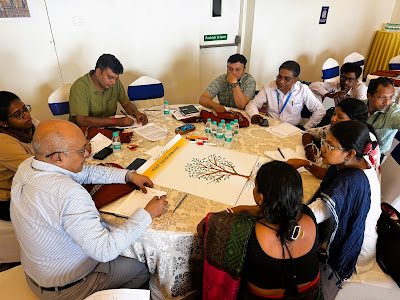By Afreen Khan and Ranjitha Puskur
KOLKATA, India (21 April 2025) -- As climate change continues to intensify across Eastern India, farming communities and especially women smallholder farmers, are facing mounting pressures on their lives and livelihoods. The International Rice Research Institute (IRRI), under the CGIAR GENDER Accelerator Sub Area of Work 1.2, organized a three-day Training of Trainers workshop in Kolkata last April 21–23, 2025. The workshop brought together lead women farmers from West Bengal Learning Labs in North and South 24 Parganas districts, alongside members of key partner organizations such as SEVA, Change Initiatives, PRADAN and ICAR-Indian Veterinary Research Institute (IVRI).
The activity mainly built the capacities of lead women farmers and teams from partner organizations to co-design adaptation strategies with farmers to deal with heat stress and floods. It specifically focused on goats and poultry, which play a pivotal role in rural livelihoods. This methodology is applicable for crops, fisheries, and other livestock enterprises as well.
The training curriculum was based on a heat stress module, developed and piloted jointly by Mahila Housing Trust and CGIAR GENDER Impact Platform in Odisha. The workshop modules discussed how to facilitate sessions on understanding local climate change impacts, such as rising temperatures and water stress and how they, in turn, impact livestock and domestic activities which women perform. Participants explored existing coping mechanisms and practiced the design of tailored action plans that incorporate their unique community needs and local knowledge.
Experts from IVRI shared research-based evidence on how heat stress and floods affect livestock and solutions to address the negative impacts. PRADAN led a discussion on ethnoveterinary practices, emphasizing the value of indigenous knowledge in climate adaptation. It also encouraged the integration of local traditions and practices into climate resilience strategies.
The workshop not only focused on technical training but also created a vibrant platform for knowledge sharing, collective problem-solving, and leadership development. Emphasis was placed on the role of women - not merely as participants, but as decision-makers and agents of change in climate action.
Dr. Ranjitha Puskur, Principal Scientist – Gender and Livelihoods, highlighted the workshop’s role in advancing bottom-up approaches to climate resilience. “When women farmers are equipped with the right skills and information, they can lead meaningful change in building climate-resilient communities,” she said.
The three-day workshop strengthened the capacity of community leaders to work with smallholder farming households to respond to local level climate change challenges. By fostering leadership, encouraging participatory planning, and promoting practical adaptation strategies, the event laid a strong foundation for community-led action. As participants apply their knowledge in their communities, the impact is expected to extend well beyond the training, contributing to nurturing more resilient and climate-prepared communities with women leading the action.
###
Learn more about IRRI (www.irri.org) or follow us on social media and networks (all links down the right column).





No comments:
Post a Comment